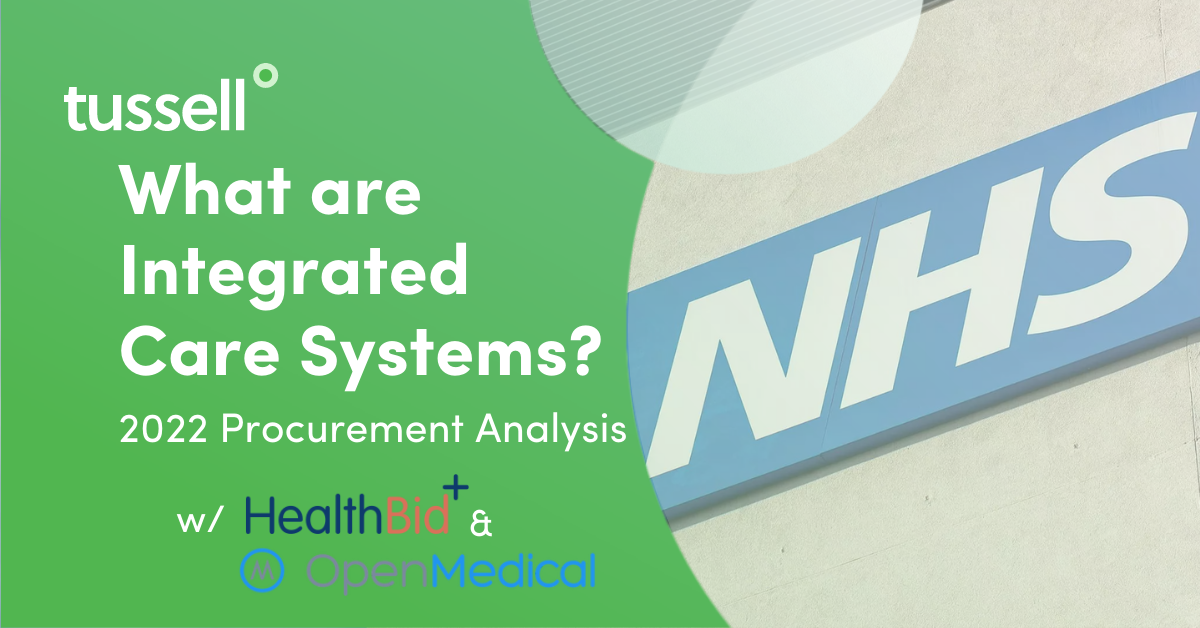The roll-out of Integrated Care Systems (ICSs) represents one of the most significant structural reforms to the NHS in the past decade. With their aim of unifying health strategy across once fragmented regional health bodies, they hope to improve the efficiency, quality and delivery of healthcare services.
With such a major change to the NHS, current and hopeful public health suppliers should understand how the introduction of ICSs will - and won't - affect their experience selling to the NHS, and what the ICS procurement landscape looks like today.
We teamed up Tom Sheppard - Managing Director of healthcare bid writing specialists HealthBid - and Michael Shenouda - Commercial Director of Open Medical, creators of the clinical workflow tool Pathpoint - to run through what the introduction of the ICSs means, the impact on suppliers, and for their reflections on data harvested from our market intelligence platform on ICS procurement and opportunities.
Click here to download our 2021 / 2022
ICS procurement analysis
NOTE: If you're an existing Tussell customer and you'd like a more in-depth look at ICSs, based on historical spending, please contact your Account Manager.
What are Integrated Care Systems?
ICSs are "effectively local or regional partnerships between healthcare commissioners, provider organisations, and the wider local authority and other local organisations involved in health and social care service provision in England", explains Michael.
ICSs will provide leadership at the newly designated 'Systems' level of local health oversight, covering populations of 1 - 3 million people. The Systems level is composed of several 'Places' (250,000 - 500,000 people), which are in turn composed of Neighbourhoods (30,000 - 50,000 people). England is divided up into 42 such Systems, each covered by an ICS (e.g. the Cambridgeshire & Peterborough ICS, the Greater Manchester Health and Social Care Partnership ICS, etc.)
The structure of ICSs will "vary from area to area", says Tom, but they will all "broadly be made up of teams from both commissioning and provider organisations to look at improvements that can be made at the System level".
In essence, ICSs will serve as the new coordinating centres of healthcare leadership and direction at the regional level, in turn absorbing the commissioning powers of Clinical Commissioning Groups (CCGs).
Why are ICSs being introduced?
By acting as the centres of local networks of healthcare bodies, ICSs aim to address some of the traditional barriers and fragmentation that have existed at the local healthcare level since the 2012 Health and Social Care Act.
"After the Act", explains Tom, "the health system was particularly fragmented, with CCGs taking over commissioning, public health moved to Local Authorities, and the market further introduced on the provider side"; this garnered the perception that "providers and commissioners within the NHS, and then public health teams in Local Authorities, were acting without a clear alignment of goals".
The aim of ICSs is to overcome this fragmentation, argues Michael. "By breaking down these traditional barriers - that have often led to silo'd care that does not consider the entire patient pathway holistically - ICSs aim to create a much more integrated approach to service provision and delivery based on local needs".
.png?width=680&name=Blog%20Banners%20(1).png)
With this integrated approach, changes can be implemented at the local level that were once encumbered by organisational boundaries and divisions. "Examples might be the development of care pathways that cut across organisational boundaries, the efficient use of estates across a region, or the adoption of common technologies", says Tom.
This, in theory, promises to improve service delivery and outcomes for patients: whether entrenched local boundaries can be efficiently overcome, however, is yet to be seen.
How does the roll-out of ICSs affect suppliers wanting to sell to the NHS?
ICSs will impact how you go about selling your goods and services to the NHS, but not as drastically as you might believe.
Going forward, it's important to think in the structures used by the NHS: namely, the aforementioned 'level' system. As Tom argues, you should understand "where your services or products sit in the Neighbourhood, Place and Systems tiers": "if you offer FM services to a Trust, or sell services to individual GP practices, then it's likely you will sit at the Neighbourhood or Place level, and there will not be a huge change". "However, if your services cross those boundaries - say, if you provide sexual health services - then it is likely that these will be commissioned at the ICS level".
How the introduction of ICSs affects health commissioning is largely contingent on just how 'Integrated' the Care Systems are, argues Michael. "If truly integrated, procurement may become easier and more streamlined, particularly for organisations that can offer connectivity across a region like ourselves".
If properly integrated, the role of ICSs as regional 'strategy setters' will be a key consideration if you're looking to do business with the NHS. "While suppliers will still need to engage with local providers, as has always been the case traditionally, suppliers will also need to ensure their products/solutions meet the wider ICS strategy and needs", argues Michael.

Tom similarly argues that you'll need to consider "the impact of your service or product on the wider healthcare economy": "if you can demonstrate that you are able to help commissioners develop integrated pathways, and understand that care doesn't start and stop at the front door of a particular institution, then you will be in a stronger position".
As such, while the roll-out of ICSs won't have too drastic an impact on how you sell your goods and services to the NHS, understanding the role of ICSs, the strategies they're implementing, and how they're cultivating a more interconnected healthcare system is key to writing a smarter bid. As Tom puts it: "a good bid will reference ICSs sensibly, a great one will understand how the service you provide fits into the new paradigm, and provides a better service for patients as a result".
What does the data tell us about the ICS procurement landscape?
With this approach in mind, the next step is to understand the lay of the ICS procurement landscape. With hard data behind you, you can pin-point which ICSs - and their respective bodies - are procuring heavily in your sector, and which are the best routes-to-market to start delivering your goods and services.
Using our market intelligence platform, we've produced an overview of the ICS procurement landscape, covering February 2021 - February 2022. Some of the key takeaways include:
-
By total contract award value, the largest ICS in England is 'Our Healthier South East London', at £1.9bn; this value overwhelming stems from a contract to Synlab UK Ltd for the provision of pathology services.
-
South West London Health & Care Partnership is the largest ICS by total IT contract award value, at £55m.
-
The G-Cloud series were the most frequently called-off frameworks, with roughly 60 contract awards being called-off through them.
-
The Cornwall and Isle of Scilly Health and Care Partnership is the largest ICS by total value of expiring contract awards in the next 2 years, with £356m rolling-off in Q1 2024.
With the exception of Our Healthier South London's huge spend with Synlab, Tom notes that spending "spending shows a consistent pattern of ICSs focusing their attention on a mix of care services, and primary IT services"; "both of these are areas that are more a legacy of their CCG roots, and do not show a particularly new approach to commissioning".
He continues: "For suppliers, this data shows a mixed picture depending on sector. If you are selling IT services, FM services, or other non-clinical services that need to be delivered at scale, then the ICS seems like it is developing as the target client. For other services, especially clinical ones, individual CCGs, local authorities and NHS Trusts will remain the first port of call: at the moment, there isn't an indication that a blanket 'the client will always be the ICS' approach can be taken".
*
Understanding the nature of Integrated Care Systems - and how they might impact the procurement of goods and services across the healthcare system in England - is key for new and old suppliers in the health sector.
As Tom and Michael make clear, speaking their language, appreciating their aims, and having the data on what they buy will put you ahead of the game.
If you want to understand more about how to start selling to the NHS, listen to our recent chat with Tom, 'Selling to the NHS: a how-to guide'.
Partners
.png?width=183&name=Logo%20(1).png) HealthBid is a specialist healthcare bid writing service, helping dozens of clients each year to win work in the health sector.
HealthBid is a specialist healthcare bid writing service, helping dozens of clients each year to win work in the health sector.
 Open Medical are a team of clinically-led digital health pioneers behind the market leading cloud-based platform Pathpoint - a dynamic system to synchronise, visualise and prioritise multi-specialist clinical workflows across hospitals, regions and departments for the best integrated, data-driven care delivery within a wider digital ecosystem.
Open Medical are a team of clinically-led digital health pioneers behind the market leading cloud-based platform Pathpoint - a dynamic system to synchronise, visualise and prioritise multi-specialist clinical workflows across hospitals, regions and departments for the best integrated, data-driven care delivery within a wider digital ecosystem.
Methodology behind ICS Analysis
This research was conducted using our market intelligence platform. Each ICS entity included their respective constituent bodies (i.e. Trusts & CCGs) excluding local authorities (e.g. local councils).





%20v1.png)



.png?width=80&height=80&name=james%20v2%20(1).png)



.png?width=212&name=Untitled%20design%20(3).png)



